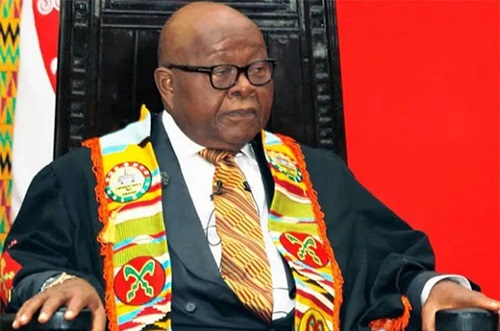
Adopt civil society approach to constitutional reforms — Prof. Oquaye
A former Speaker of Parliament, Prof. Aaron Mike Oquaye, has proposed that civil society organisations must be allowed to lead the process of initiating constitutional reforms.
He explained that the civil society approach would bring about broader consultations and introduce techniques such as peace-building in the reform processes for effective implementation of reports on constitutional reforms.
Prof. Oquaye, who is also a distinguished scholar of the Institute of Economic Affairs (IEA), a policy think tank in the country, was speaking in an interview with the Daily Graphic in Accra ahead of last Sunday’s commemoration of the Constitution Day.
He said the implementation of the report submitted by the Constitution Review Commission (CRC), chaired by Professor Albert Fiadjoe hit a snag because of the government White Paper on the report.
He said the White Paper was unfair because it had in a way politicised the report.
“The government placed a white paper on the CRC report.
A constitutional review should be done by a broad committee that would bring proposals, which would be put together by way of referendum to the people.
If you make it government matter, then you have spoilt it.
“We should get both the government and opposition to have a broad view on the constitutional reform, and the questions put to the people by way of a referendum,” he said.
Way forward
Prof. Oquaye, who is also the first head of the Prof. Mike Oquaye Centre for Constitutional Studies within the IEA, said: “Although the implementation of the CRC report had become difficult, it is still useful, but it teaches us that we should adopt the right approach and cooperate more with civil society”.
He said the Constitution, as perceived by the IEA, should be “a living document that Ghanaians should be working with all the time, guiding the nation's steps towards good governance”.
“Most unfortunately, the Atta Mills government put a White Paper on the CRC work, making its own suggestions as to areas that should be worked upon.
It was unfortunate, so now it has assumed a political character, and we are suffering from it till today.
We are making sure that going forward, we are involving everybody,” Prof. Oquaye added.
He said the Transition Act drafted by the IEA involved a broader consultation, including the input of the two major political parties, the governing New Patriotic Party (NPP) and the dominant opposition National Democratic Congress (NDC).
“So, actually, things can be initiated by civil society.
But if one party initiates it, the other parties will say, ‘oh! they have got an ulterior plan’,” the distinguished scholar said.
On the Constitution Day celebration, the former Speaker of Parliament stated that Constitutionalism had come to stay.
“If we don't like the government of the day we criticise it, and if the time comes for us to change it, we go ahead and change it. But there is nothing like military intervention in politics anymore.
For that matter, the Constitution clearly defines Ghana's civilian-military relations.
To put it briefly, there must be subjugation of the military to civilian authority.
And that is Constitutionalism,” Prof. Oquaye explained.
The distinguished scholar indicated that when the Constitution was established and respected, its provisions and tenets must be rigidly adhered to such that the elected President would remain the head of government, where nobody could remove him or her from office by the fiat of a military government.
“If the government is not good, we will criticise it, and if it is doing something illegal, take it to court.
If the time comes for you to vote and you don't like the government, vote against it.
That is the essence of a constitutionally governed society,” he said.
Background
On January 11, 2010, President John Evans Atta Mills, acting in accordance with Article 278 (1) of the Constitution, which confers on the President the powers to appoint a Commission of Inquiry into matters of public interest, inaugurated the CRC.
The CRC was mandated to review the 1992 Constitution under the Constitution Review Commission of Inquiry Instrument 2010 (C.I. 64).
The commission was tasked to collate the views of Ghanaians on which provisions of the 1992 Constitution required amendment.
In executing its mandate, the commission travelled across the country to hold consultative fora with the public.
It also received memoranda on what provisions of the Constitution needed to be amended, and how the CRC should conduct its affairs.
It further engaged the services of experts to review the Constitution and make recommendations for reforms.
The commission worked for two years, and after analysing all the submissions, as well as receiving expert opinions from both local and international consultants, it completed and presented its report to the government on December 20, 2011.
After receipt of the report, as per Article 280 (3) of the Constitution, the government, on June 15, 2012, gazetted a White Paper stating its position on the recommendations.
After issuing the White Paper, the government set up the Constitution Review Implementation Committee (CRIC) on October 2, 2012, to further study and engage with citizens towards the implementation of the recommendations approved in the White Paper.
However, after 10 years of its presentation, the commission's recommendations are yet to be implemented.
This has generated public discourse among civil society organisations and the public who seek to know why the commission's recommendations are not being implemented.
